Quad-Cities High School and College Arts Struggle, Adapt During Covid
 Saturday in the Arts is a comprehensive, in-depth look at a personality, issue, or trend in the Quad-Cities arts and entertainment scene, running every Saturday morning on your site for fun, free, local entertainment and features, QuadCities.com.
Saturday in the Arts is a comprehensive, in-depth look at a personality, issue, or trend in the Quad-Cities arts and entertainment scene, running every Saturday morning on your site for fun, free, local entertainment and features, QuadCities.com.
For many high schools and colleges throughout the Quad-Cities, the show must go on – even during a crippling global pandemic that’s turned education upside down.
With schools taking differing approaches to in-person and online instruction, each also is taking individual, thoughtfully considered approaches to continuing with their music and theater programs. While indoor performances for the public are unlikely for most, several schools are finding ways to still provide performing arts outlets for students.
Davenport Central High School
“Right now everything is up in the air here at Central,” said Thea IntVeld, drama director at Davenport Central. “We are giving it until Oct. 1st to make the major decisions regarding concerts etc., but we have had to cancel many events already this year.

Thea IntVeld is drama director at Davenport Central.
“Marching Band and show choir will not compete this season but will continue to play at football games and possibly host something this spring for show choir,” she said. “As for theatre, I have a fall play I’m hoping to get approved to present with a livestream audience and safe on-stage interaction, but the musical in the spring is still undecided.”
“I attended a professional workshop on how to put on a performance safely; I had a theatre teacher in Indonesia share with me a video of one of their productions and how they handle rehearsals etc. and I mentioned we already paid the rights, which is a huge loss of income if we end up cancelling,” IntVeld said.
“I feel very strongly these kids need something. We are running sports events, including indoor ones as well. Why couldn’t the arts run as well? We are looking into ordering special masks for the student performers that would be well worth the cost just to get them on a stage.
“We run the classes with choir and band, so a concert doesn’t seem that much different, it seems a drama club of 20 members can stand outside in a circle and play theatre games,” she said.
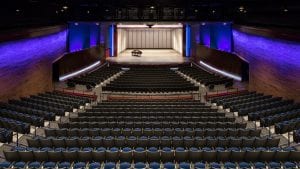
The auditorium at Davenport Central.
The Iowa Thespian Festival was moved to the spring 2021 and turned into regional locations to minimize the amount of attendees.
“I would love to have our kids do something at it this year,” IntVeld said. “Hopefully by spring, we will open back up the opportunities. But right now, it’s all up in the air and we are just waiting to see what the board decides to do. If they do end up canceling the arts, I feel like the already quiet hallways and disengaged students will get much worse.
“They won’t have anything to look forward to and the parents that fought for their kids to go back to school for the social factor, have no idea how unsocial school really is right now,” she said. “No homecoming. No pep rallies. No parades. No dances. And I’m afraid pretty soon… no arts.”
The Central orchestra has rehearsals as normal, and their room allows students to stay six feet apart. Students are not allowed to share materials like music or other equipment. The school is investigating staggered concerts, or live streamed concerts.
Davenport North is going by the assumption that they’ll start just recording performances in the classroom, and may have small concerts by the second semester. Large concerts like an 800-person “Messiah” won’t happen in person.
Bettendorf High School
Mike Dynes, Bettendorf High School Marching Band director, said his 160-piece band has been divided into four separate ensembles to rehearse indoors.
The entire student body is split into cohorts, with each one attending school in person two days a week, and alternating Wednesdays. Students in choir and orchestra rehearse in smaller groups as well, Dynes said.
Marching band students wear a mask at all times, with a foldable flap in the middle, which allows them to access the mouthpiece. The wind and brass instruments also have bell covers, to control breath emissions, he said.
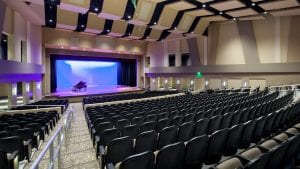
The Bettendorf High Performing Arts Center.
“When we are outside, everyone in band is a four-step block apart, and that’s basically 7.5 feet between every kid,” Dynes said. “Drill movements we make on the field, everyone moves together, and when we are inside rehearsing, everyone is socially distanced, there’s an x on the floor, which gives every student an assigned spot on an x, socially distanced apart. We have them all have them facing the same direction. There’s no concert seating we would typically run in rehearsal.”
They had their first football performance on the night of Sept. 11; they played a pep rally Sept. 17 and had another game on Sept. 18.
The band doesn’t sit in the stands like normal, but behind end zones, socially distanced. “I feel like we’ve done a good job keeping kids safe on our end,” Dynes said. “We thought through as many things as we possibly could; we’re still learning.”
Indoor concerts are up in the air, he said. “The fall is marching band time, and we’re trying to give kids as much of marching band experience as we can.”
They’re not competing like they usually would, and All-State auditions will be held virtually in late October, instead of in person, Dynes said.
“The format of the All-State concert has changed already from what typically has been in the past, with three separate ensemble concerts,” he said of the weekend before Thanksgiving.
The full marching band also has two rehearsals a week outside at 7 a.m.
“It’s been difficult not rehearsing as often, and the pace of rehearsal, trying to learn music and drill is much slower,” Dynes said. “You have those cohorts, practice with them four separate times, and to try and bring them together as one — it’s a huge challenge. Normally, we would have them in a 75-minute block every day.”
For Homecoming in a normal year, the band would be in a parade, coronation ceremony, the game and dance on a Saturday. This year, there’s no dance — they’re doing a drive-in movie, socially distanced, at the school outdoors, Dynes said.
And the football games are not open to the general public. Every player and band member, cheerleader, and dancer, gets three tickets to give out, to whoever they want to, he said.
“There’s a fourth of the people here that normally would be here,” he said Thursday. “Last week, it was almost eerie how quiet it was. There’s a lot of learning curve for this new era that we’re in right now.”
Katie Howard, BHS director of theatre, said: “Covid has definitely presented a great number of challenges from the production aspect. We generally present at least three shows a year, but have had to cut back to two.”
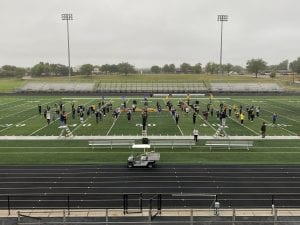
The Bettendorf High marching band practices on the football field.
“It has also altered the type of production that we will be doing. Instead of presenting a live, full-length show, we will be pre-recording a shorter play (“Selfie”) and broadcasting it through a closed YouTube channel,” she said.
“If we did not pursue this option, actors would be required to wear masks and maintain 6-feet social distance. This distancing will also not allow for traditional rehearsals,” Howard said.
“We have carefully selected a script that is primarily monologues and scenes between two people,” she said of the fall play. “Due to a smaller cast size, I will be able to work with students one-on-one at school or even have rehearsals virtually from home, I do believe this will have both benefits and challenges.
“Students who have been unable to participate in productions because of other practices or rehearsals will now be able to be involved however it will minimize the involvement of students who work behind the scenes building sets, running lights, and designing sound,” she said.
“Covid has taken away so many opportunities for everyone, young people in particular, and I’m glad that we’re able to offer this opportunity to them to be together and create art with the hopes that we will be able to return to ‘normal’ for our spring production of ‘Bright Star’,” Howard said by e-mail.
Megan Cooney, conductor of the BHS orchestra, is rehearsing with smaller groups that are socially distanced in the Old Auditorium. “With the split of students and the number of students online, I have a max of 22 students in a rehearsal. The smaller rehearsal size is really nice,” she said.
“As far as performances go, I don’t really have any answers for that. We are just starting to have those discussions,” Cooney said. “If we do have a performance, students will be socially distanced on stage and the audience size will be significantly decreased.”
Pleasant Valley High and Junior High
PVHS has started rehearsals for a smaller musical, “The Theory of Relativity,” which has two casts of 13 students each, said director Christina Myatt. It’s unclear if the November performances (split between the two groups) will be in front of an audience or live-streamed, and during performance the kids may wear masks. All rehearsals are in mask.
“The production will be created in a socially distanced way. The orchestra (which is really just a combo) will probably be onstage – distanced — and can be masked throughout,” Myatt said.
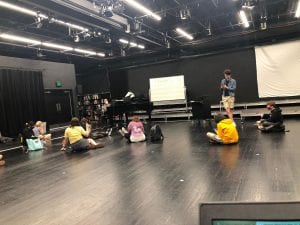
PV drama students rehearse “The Theory of Relativity.”
“Our main goal was to ensure that students had opportunities and that we could present the show in whatever arena we were given. Thus, we picked shows that could be live or streamed in some way,” she said. “We knew things would have to be smaller in order to provide socially distanced blocking. In a typical year, we would cast between 30 and 40 students.”
They discussed the possibility of doing two musicals. But that would create double duty for directing, music direction, and many of the technical elements, Myatt said.
“Another theatre teacher that I know mentioned they were double casting their show and the light bulb went off. By double casting (13 in each cast), we got closer to our usual number of cast,” she said.
“It also offered twice as many featured opportunities. It also provides a great educational opportunity,” Myatt said. “Students have the opportunity to look at different interpretations of the material. They can see other interpretations which may stimulate their own creativity and learn from each other.
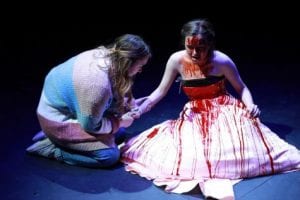
Pleasant Valley High performed the musical “Carrie” last fall.
“It is part of what makes theatre exciting. One can see numerous productions of the same show and enjoy them all because the vision and interpretations will always be different,” she said.
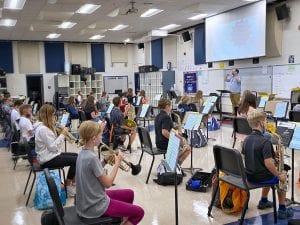
Nick Propes leading a band practice at Pleasant Valley Junior High.
The musical is scheduled for six performances Oct. 29 to Nov. 8.
Nicolas Propes, band director at Pleasant Valley Junior High, doesn’t have performances scheduled but said: “I have been very pleased at what I’ve seen from the school district and their level of preparation and how they are taking this whole situation seriously.
“Students are hand-sanitized before entering every single classroom. They’re wearing masks all day, every day throughout their classrooms and I have not seen a single student who has not been taking it seriously,” Propes (one of two band conductors) said. “Any time they are not actively playing their instrument, they are wearing their mask and then anytime they are actively playing their instrument, they can remove their mask, but their instrument itself has a mask on.
“They are still masked, but the mask is on the end of their instrument,” he said. “We’re doing a pretty good job of keeping those aerosols contained, whether it’s with the face mask or the instrument mask. Then we are doing the socially distanced thing.
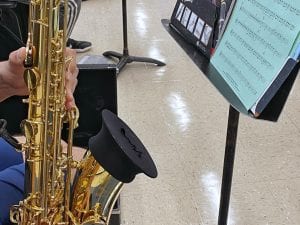
A PV saxophone player uses a bell cover.
“Kids would normally be sitting next to each other in a normal rehearsal, and they’re now all spread six feet apart for rehearsals,” Propes said. “So the socially distanced aspect is part of the reason I come into play, because we are spread out, we get fewer students into the classroom.
“So we ended up splitting some of the ensembles into smaller groups, so one teacher is teaching a small ensemble in one room and I’m teaching another ensemble in the other room,” he said. “That’s why I was asked to come back, to help with these split rehearsals, to have extra teachers on hand, to make sure all of this is safe and we can continue to make beautiful music and still remain healthy.”
The mask for instruments goes over the bell of the instrument, to catch the air. Some are like plastic food covers, or a shower cap, and some smaller instruments have like nylon socks.
They do not muffle the sound, Propes said. “We haven’t had that issue so far. It does make a difference,” he said. “But it’s not significant. At this level of education, it’s a fair trade-off between sound quality and staying healthy.”
North Scott High School, Eldridge
Due to Covid, North Scott High School cancelled its Homecoming football game Sept. 18. No date to make up festivities has been set at this time. All NSHS activities/athletics are cancelled with additional information to be shared in the future, it tweeted on Thursday.
The North Scott district reported 11 positive Covid cases among high school students and staff, and closed the school Sept. 18. Instruction will be done virtually through Oct. 5. According to the Scott County Health Department, Eldridge has doubled the number of positive cases in the past four weeks, with the number projected to double again in less than a month.
As of Friday, there were 5,525 positive cases of Covid reported in Scott and Rock Island counties. While those are fairly split between both sides of the river, the death rate in Rock Island County from the virus is three times higher – 75, compared to 27.
Moline High School
The Bartlett Performing Arts Center in Moline is continuing to strictly abide by Illinois government guidelines, so there are no community events scheduled until 2021 due to restrictions, said Karlie Sandrock-Walsh, operations manager for the auditorium.
“We are currently developing alternatives for renters to plan events within the Bartlett PAC whilst abiding all requirements surrounding each person’s safety,” she said.
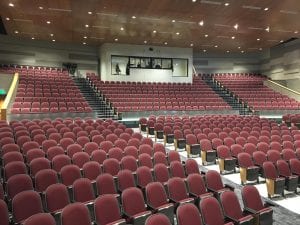
The auditorium at Moline’s Bartlett Performing Arts Center.
“The Moline High School drama affiliates have been meeting and rehearsing virtually for their fall play. We hope we’ll be able to stream a performance for the community to see live from their homes.”
There will be recorded band and orchestra concerts in the Bartlett PAC for a concert “release party” at a later date on the MHS social media pages, Sandrock-Walsh said. “Because we can’t have the entire ensemble for space concerns, we’re doing brass choir music and woodwind choir music. It gives the students an opportunity to work on that genre of music, which we don’t regularly do when we have a full band.
“Moline-Coal Valley School District and Bartlett Performing Arts Center will continue to keep the health of students, staff, and community members the main priority,” she said, noting the drama program is currently in rehearsals (with masks and distancing) and will be streaming/recording three nights of their performances. Further details can be found on @maroontheatre.
The choir hopes to be able to record a performance in the near future, and is rehearsing in class (masked) at a distance, Sandrock-Walsh said.
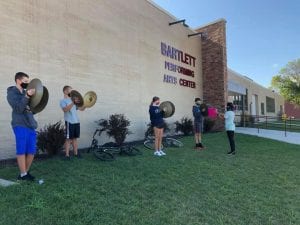
Moline percussion students practice outside the Performing Arts Center.
A group of over 120 performing arts groups commissioned a study by scientists from the University of Colorado Boulder and University of Maryland. Last month, they published preliminary results indicating that because aerosols are released by singing, choir participants should wear masks, stand six feet apart and rehearse for no more than 30 minutes at a time.
A New York Times piece this month said new masks are being developed to make singing easier, like the Singer’s Mask, sold by the Broadway Relief Project, which protrudes from the face. Such masks are becoming increasingly popular, with West Virginia University’s choral
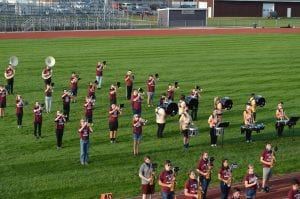
Moline High School marching band performing at Browning Field.
director having also made a version.
Some choirs in the U.S. were getting around the suggested time limit by swapping rooms after 30 minutes, Allen Henderson, the executive director of the National Association of Teachers of Singing, said, though most are still gathering solely online, he added.
Zack Morton, director of instrumental music at MHS, said they’re abiding by safe rehearsal guidelines set by state and national school groups.
“Those guidelines include a set amount of space between musicians (6×6 foot square for all but trombones, they get a 6×9 foot rectangle), all musicians wearing masks that have been adapted to permit playing through them, not sharing percussion mallets, sticks, etc., and limiting rehearsal time to 30 minutes so the HVAC system can have time to clean the air before the next class comes in,” he said, noting he stands 10 feet from the front row.
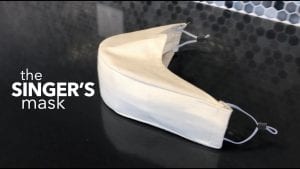
An example of the new Singer’s Mask.
“Next quarter, when I get to see my orchestra classes, we won’t be confined to the 30-minute rehearsal time window because string players can wear a mask while they’re playing without having to adapt it like a wind player,” Morton said.
Rehearsals have been going well, and with the smaller ensemble sizes, “we’ve been working on chamber music for a concert that we will video and audio record, and release online for viewing since we are not able to have a live audience,” he said.
“We don’t often work specifically on small chamber music, so this gives the students a great exposure to a genre of music, and a style of playing that we don’t always get to dedicate a lot of time to,” Morton said.
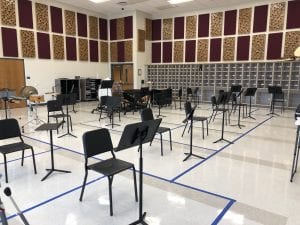
The band room with distanced seats at Moline High.
“Since we’re currently doing a blended learning model, it’s nice that I still get to rehearse with the students in person, and the only difficulty initially was getting enough chamber music since we don’t have a large chamber music library, but now that we have it, and we’re rehearsing, it’s going well.”
“The students have been great at following all the guidelines, and so far, we haven’t had any issues,” he said.
Moline High freshman Lucy Lareau plays trumpet two mornings a week in band.
“In class, everyone is spaced out. And, we have to wear a mask. We cut a hole in the mask to play,” she said. “It’s not hard to play and my trumpet sounds the same. I only play with half the freshman band and the other half plays on Wednesday and Thursday. So it will be fun to see how we play together! We are rehearsing for a performance for our parents this fall.”
Rock Island High School
“Rock Island is remote learning for the time being,” Rocky orchestra director Matt Manweiler said. “We are having group online lessons
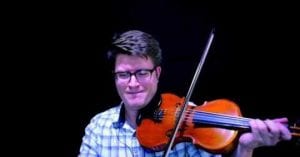
Matt Manweiler, a violinist, is Rocky’s orchestra director.
several times per week, a YouTube page for individual lessons and coaching, and lots of back and forth video recordings for individual help.
“We will do some sort of showcasing of our students’ work, and are preparing for both in person and digital options currently,” he said. “The decision of live concerts will be made with our administrators.”
Rock Island High theater director Dorian Foster she and her students are “thinking in terms of projects rather than big productions for the year. Biting off a bit at a time and identifying ways to experiment or develop in other areas.”
“Most will be done virtually,” Foster said. “We’re not tied to IHSA, but we’ll follow the same general guidelines for any in-person activities like other arts groups. Our usual fall production happens around Halloween, so we’re working to stick with that date and do something along that theme.”
“We’re planning on recording and streaming ‘Hallmarks of Horror’ on October 30 and 31st. The kids and I are working on how to best structure our time and develop resources. We’re fully remote, so that’s presented some challenges that we’ll work through.”
United Township High School, East Moline
On-campus class sizes at UTHS are capped at 16, or even lower to ensure compliance with 6-foot distancing, with in-person classes only half days.
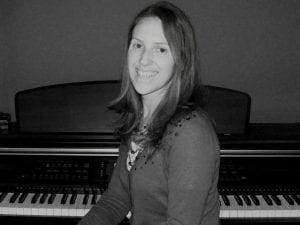
Juliet Minard is director of the UTHS choir.
For choir teacher Juliet Minard, she plans to release performances as a virtual concert, where each student records their portion and they’re compiled into one complete video performance.
“No decision will be made regarding live or virtual performances for second semester until at least December,” she said. “We will not to get to perform in the community at nursing homes, luncheons, or holiday occasions, which is disappointing. We are brainstorming ways to connect with nursing homes, especially, as they’ve been targeted with the strictest isolation rules and need a musical visit most of all.”
Meeting on campus with half a class at a time and having generally lower enrollment because of remote assignments or complications due to changes in the master schedule has created a lack of security for kids on each voice part, Minard said.
“There are a couple instances of one student in a section; more commonly four students in a section during our rehearsals. This is challenging, as young singers find confidence in larger numbers,” she said. “They’re used to singing in a section of 8 to 14, where you can lean
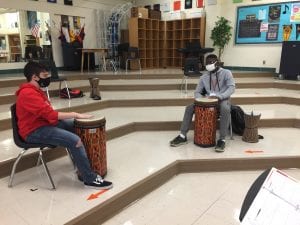
Students practice world drumming at United Township.
on each other and not feel so exposed. Singing in the classroom is also challenging because we have to wear masks, making it difficult to take in a big breath and impossible to sing at full volume.
“We have the opportunity to rehearse outside, with further distancing and without masks, and will utilize that option now that it’s not too hot or wet,” Minard said.
Small class sizes allow her to give more attention to individual students, but teachers have had to learn more technology for remote learning.
“I am appreciative of the extra professional development days we were given during the first two weeks of August where we learned from our building colleagues and corporate leaders how to make digital lessons more engaging and relevant,” Minard said. “Those tools would have been cumbersome and frustrating had we not had the proper training in the beginning.”
She also teaches world drumming, however, there is way more sanitation with disinfecting instruments every class period and lots of hand washing.
Alleman High School
Leslie Zeglin, assistant theater director for Alleman in Rock Island, said they’re not able to do their traditional fall musical.
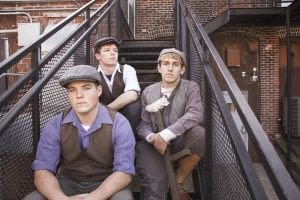
Alleman High performed the musical “Newsies” last fall.
“Our fall show is typically our largest show of the year, and we knew it was best for everyone to come up with an alternate plan,” she said. “As it stands, the Diocese of Peoria has said there cannot be any performances this fall. We are still working on a way to keep our drama students involved in theater.”
Due to Covid restrictions, the 2021 Illinois High School Theatre Festival already has been postponed until January 2022.
“This was a very difficult choice,” says illinoistheatrefest.org. “Keeping the safety and well-being of our ITA members and their students in mind, we made an informed decision after considering the uncertainty surrounding the following concerns:
- If the fall semester was in person or online at both high schools and universities.
- If schools have permission to produce life theater.
- If Illinois governments will open for large gatherings of over 4,000 people.
Current Illinois law mandates that indoor theater capacity be limited to only 50 patrons, not including cast and crew.
Augustana College, Rock Island
The Augustana Symphonic Band is rehearsing in person this fall, with two members opting for distance learning through synchronous methods, said director James Lambrecht.
The band is working in smaller wind ensembles of up to 50 people, preparing literature that will be recorded and shared to the campus virtually later in November, he said.
“The main goal is to be together again, making music, and building ensemble continuity and community, in the hopes of traveling to Japan in
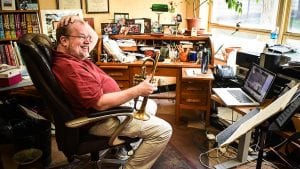
Augustana Symphonic Band director James Lambrecht teaches virtually.
May 2021 – a tour which was postponed from this past spring due to Covid-19,” Lambrecht said, noting performances will be done without an audience, but will be uploaded to YouTube for later viewing.
In a May piece at augustana.edu, he noted how difficult it can be to make adjustments during virtual music lessons.
“Sometimes you have to touch [a student’s] hands and show them where to place their fingers on certain things on a keyboard,” Lambrecht said. “It’s easier to be right next to somebody and show them how to breathe, but you can’t do some of this stuff in two dimensions.”
Keeping an upbeat outlook in the face of drastic change is vital, he said, noting: “When I’m teaching, it’s 150% positive, all the time.”
For musical theatre instructor Shelley Cooper, “movement classes are a whole different beast.”
Live warmups are held virtually twice a week, followed by “Broadway boot camp,” in which Cooper films a new dance combination from a well-known musical that her students imitate.
Adapting courses such as Jazz Dance have required Cooper to minimize space used — where students before had free range of a studio, Cooper must now “figure out how to make my dances fit a [computer monitor] box or iPhone screen,” she said.
She stresses the importance of addressing the “white elephant” of anxiety and loneliness for students separated from their peers.
She wants to show her students “that they have someone who cares, because it’s so important… asking honestly at the beginning of class how they’re doing and allowing students that want to speak up, to speak up,” Cooper said.
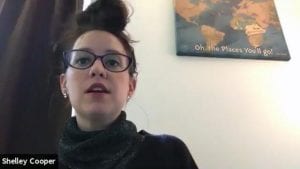
Augie’s Shelley Cooper teaches a theater class virtually.
She has newfound time to implement one-on-one sessions with students and has also invited directors and actors from all over the world to guest lecture for the Voice and Movement and the Musical Theatre History classes.
“Experiences like that have been really unique because of the Covid-19 situation,” Cooper said. “These performers and directors aren’t as busy as they usually are, so they have time to come to class.”
Augie professors are looking forward to being back in the studio and rehearsal space with their students. “It’s going to be crazy exciting, like a reunion,” said Lambrecht.
“I don’t think, for the next 3, 4, 5, 6 years maybe… we will ever take for granted being in class with our peers, being together in rehearsals, being in performances, being able to create our music or our art.”
Only one concert is scheduled so far, a virtual faculty recital on Oct. 20, featuring Janet Stodd, flute; Susan Bawden, bassoon; and Sheila Doak, piano.
Black Hawk College, Moline
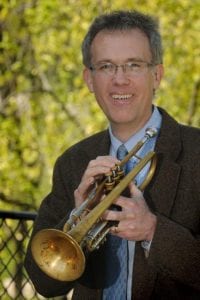
Edgar Crockett heads Black Hawk College’s performing arts department.
Edgar Crockett, music professor and chair of BHC’s performing arts department, said the instrumental music area is rehearsing chamber ensembles: duos, trios, quartets and quintets in large areas. “We also plan to record chamber music in our theatre which will be available for virtual audiences,” he said.
Crockett is hoping to schedule a drive-in concert performed by the BHC Jazz Combos.
Irene Leites, music instructor, said of vocal groups, only the concert choir is meeting, limited to 17 students, the director and an accompanist. The rehearsal space has been moved to the theatre in Building 1 instead of their usual rehearsal space. Practicing in this new space allows the masked singers to spread out and sing with a 6-foot radius around each person.
Once a week, the group rehearses in an outdoor courtyard. “We will not be having a public concert. Instead, the Concert Choir will be recording performances outdoors and sharing them,” Leites said.
St. Ambrose University, Davenport
Nathan Windt, director of choral activities at SAU, said since early May, he’s been reading scientific studies that address the intersection of music, Covid, how the virus might spread in ensembles, and the means to mitigate the spread so that ensembles may still meet in-person.
“Audio and video latency make ensemble singing online a virtual impossibility,” he said. “However, we also want to make sure student health is a priority in any in-person scenario, while meeting learning objectives of our curricular ensembles.”
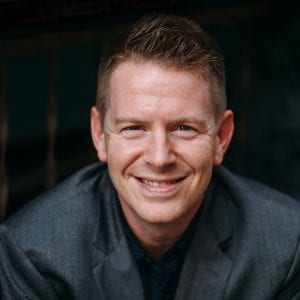
Nathan Windt is SAU director of choral activities.
Last month, Windt met with Dr. Colleen Doak, SAU Health Sciences faculty whose specialty is viral epidemiology. “She was extremely helpful through the summer in reading and discussing these studies with me,” he said, as well as the American Choral Directors Association recommendations.
Students are wearing masks throughout indoor rehearsals. Students are distanced at over six feet apart and arranged in straight lines, which eliminates face-to-face interaction while singing. There are no desks, music stands, or other surfaces that are contaminated.
Students sing a maximum of 30 minutes before taking a break to clear the room. These student groups will be the same throughout the entire semester, creating a “class pod.” Each pod has been capped at a maximum of eight students for the regular rehearsal room.
They must enter and exit the room wearing masks, and they must enter and exit the room in a particular order, Windt said.
“We have fortunately encountered no resistance from students regarding singing with masks,” he said. “We never exceed 30 minutes of continuous singing; most rehearsals are 20 minutes.”
Unless there’s a breakthrough regarding treatment for the virus (a vaccine), they’re forgoing in-person concerts for ensembles this semester.
“However, we also know how goal-oriented the performing arts are. With that in mind, our ensembles are all learning new repertoire to pre-record in our large performance space, which we will then release online via the SAU Music Facebook page and other online services,” Windt said.
“These selections may be mixed with past video and audio performances to round out a longer, more traditional concert experience,” he said, noting they plan virtual concerts in October and December.

Nicholas Enz is SAU director of bands.
“While we acknowledge that things may be different for a while, we also recognize the power of music and the shared creative experience that makes choir and other musical ensembles so transformative in the lives of singers,” Windt said.
Nicholas Enz, SAU director of bands, said: “I have been impressed with how quickly the world’s performing arts organizations came together to fund these studies that look at aerosols in performance and pedagogical settings and recommend ways to minimize risk.
“I think this illustrates how much the arts are part of society. It is also great to know that one of top team of experts in the field of aerosols is working on this project,” he said.
His rehearsals also are limited to half an hour, musicians spaced at least six feet apart. There is a maximum number of people that can be in the rehearsal room and on stage at one time.
All wind players are using bell covers, and use special masks that allow mouthpieces/reeds to be inserted, so they can continue to wear masks during rehearsal and performances.
Equipment is not shared without being wiped down (chairs, stands, etc.). All performances will be streamed with a limited in-person audience. All students and faculty are screened on a daily basis for symptoms.
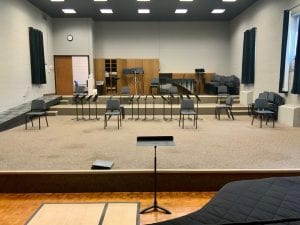
The choir room at St. Ambrose University.
“Our music students are very diligent in following the protocol,” Enz said. “We’ve not had any member of the band test positive here at SAU. Additionally, a national survey from the College Band Directors National Association reported just two weeks ago that since the beginning of August there were no known cases of Covid-19 transmitted during college band activities.”
“In terms of challenges, because we can’t meet as a full band, we’ve divided the band into three groups: a brass choir, a woodwind choir, and a percussion ensemble,” he said. “Each of these groups are preparing separate repertoire for our fall performance. While this focus on smaller groups is certainly different, it does allow for more a specific pedagogy to be used with each group and we have the opportunity to play repertoire that usually doesn’t get the same attention as traditional full band music.”
“I have been in communication with many of the composers we are playing and our students will have the opportunity to communicate with these composers,” Enz said.
“While I was somewhat hesitant going into this semester because the situation was so unlike to anything I am used to, I no longer feel that hesitancy,” he added. “I have talked to many students excited that they still have an opportunity to play during the pandemic and they like the variety of music. I think I have heard the phrase ‘Band is the class I look forward to the most’ more this semester than any other.”
“Another big surprise for us is the sheer number of first-year students in the bands—I think we have the largest number of first-year students in my ensembles in my six years at Ambrose,” Enz said.
Quad City Symphony Youth Orchestra
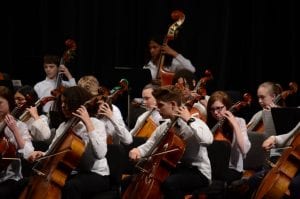
Students perform in the Quad City Symphony Youth Orchestra.
The Quad City Symphony has outlined detailed Covid procedures for each of its youth ensembles, though there are no set plans for performances yet. For the top group, the Youth Orchestra, the rules include:
- Face masks or face coverings are required before, during, and after QCSYE events.
- No car-pooling to QCSYE events.
- Members should use hand sanitizer or wash their hands before and after rehearsal.
- Set-up of instruments should occur within each member’s 6×6 ft. rehearsal space. • Members will not be permitted to socialize/congregate outside their individual 6×6 ft. area.
- Any member exhibiting symptoms of Covid-19 will not be permitted to practice or perform.
- Clear signage will be posted reminding members to remain physically distant (6 ft. apart) and use hand sanitizer if possible.
- Hand sanitizer will be readily available at the rehearsal entrance.
- Rehearsals will be condensed to shorter duration with no break to minimize contact among members.
- Because there are no rehearsal breaks, use the restroom before arriving to QCSYE events.
- Members will be physically distant from each other during rehearsals (6 ft. apart). • Members will bring their own music stand. Sharing of music stands will not be permitted.
- Rehearsals will be moved to a larger rehearsal space.
- Hybrid rehearsals will be planned to engage all students each Sunday to keep rehearsals to 50 persons or less, including splitting ensembles, with some students attending both rehearsals (tuba, percussion, etc.).
- Because the YSO roster is greater than 50 members, approx. 36 members will be sent a link to a livestream of the rehearsal and will be expected to attend the virtual rehearsal when not attending in-person. Members attending the live rehearsal and those rehearsing virtually will be announced in each weekly email.
- Members should wash their hands and clothing when returning from rehearsal.
- Repertoire recordings and copies of music will be available online.
- For wind players, face masks should always be worn (no face shields). This may require a hybrid face mask that contains an opening for a mouthpiece.
- No talking should occur in the room without a facial mask or face covering being properly worn (covering the mouth and nose).
- Spit valves should not be emptied on the floor. Recommendation: Bring a puppy pad (or similar) to catch the contents of the spit valve and discard in the trash after rehearsal.
In-person at SAU and tracking Covid
A socially-distanced concert was held Aug. 7 at Galvin Fine Arts Center, St. Ambrose University, featuring Quad City Symphony concertmaster Naha Greenholtz and pianist Marian Lee (who teaches at SAU). Music lovers had the option of paying $25 to be one of just 50 in the 1,175-seat auditorium or to watch a live-stream from the comfort of their home.
With a multiple high-definition camera setup, livestream viewers got an up-close view of these two musicians at work, unlike anything they could experience at a traditional concert.
At Galvin, attendees were be spread throughout the hall to ensure recommended social distancing.
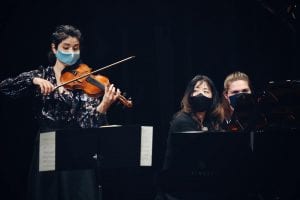
Violinist Naha Greenholtz and pianist Marian Lee played last month at St. Ambrose.
Masks were required for entry, while waiting for entry, exit, and to move about the common areas. Masks were strongly recommended but not required when attendees are in their seats.
Across nearly 1,200 colleges and universities in the U.S., over 88,000 positive Covid cases have been documented, including more than 1,600 at the University of Iowa, according to a New York Times database.
The National Education Association recently launched a tracker of cases in public K-12 schools.
The tracker is broken down by state and shows schools and counties with known cases and suspected cases and deaths, as well as whether those infected were students or staff. It also includes links to local news reports, so users know where the virus data comes from.
The NEA tracker builds on the volunteer efforts of a Kansas theater teacher Alisha Morris. In early August, ahead of the new school year, Morris was looking for data about coronavirus cases in U.S. schools, according to NPR.org.
She could find local news reports about positive cases at individual schools across the country, but nothing that gave her a cohesive picture of how the virus was spreading in schools.
So Morris built it herself.
As many orchestras nationwide have cancelled in-person concerts for the fall, the show must go on for the QCSO. It’s proceeding with fall Masterworks concerts at Davenport’s Adler Theatre, which will undergo some major changes.
Following recommendations from the Scott County Health Department, the QCSO has altered its October, November and December programs – to cut the ensemble size in half, to about 40 musicians; allow only 25 percent capacity in the Adler for both Saturday night and Sunday afternoon concerts; require masks and social distancing, and eliminate intermissions and sale of concessions.
The first concert is Saturday, Oct. 3, at 7:30 p.m., featuring Beethoven’s Symphony No. 1.
A Live Stream will air Sundays at 2 p.m. via the QCSO’s Uscreen Channel. Digital access can be purchased for a single event or as part of a Pick-3 or full season subscription. Only one ticket is needed per household, and is available at $40 per concert, or $102 for all three concerts.









